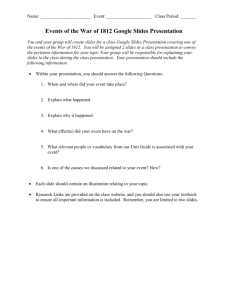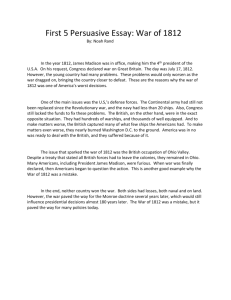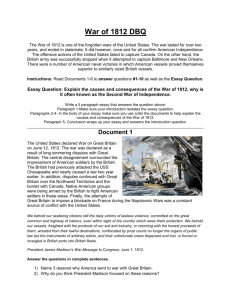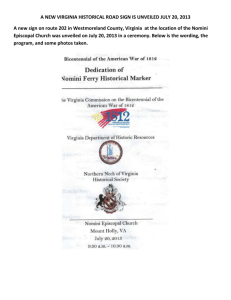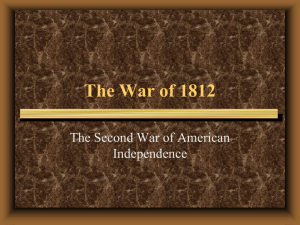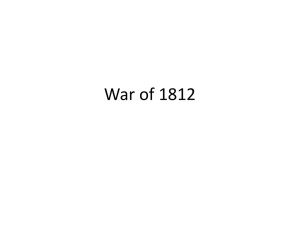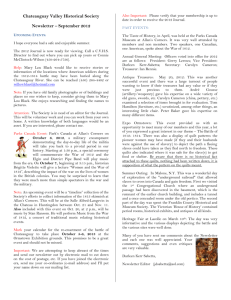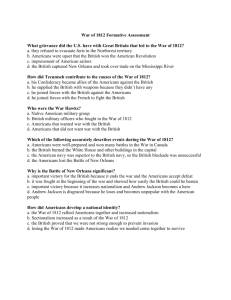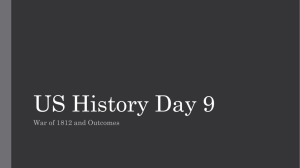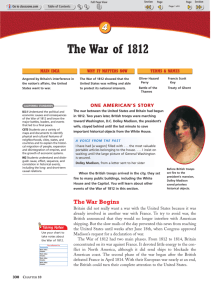The War of 1812
advertisement
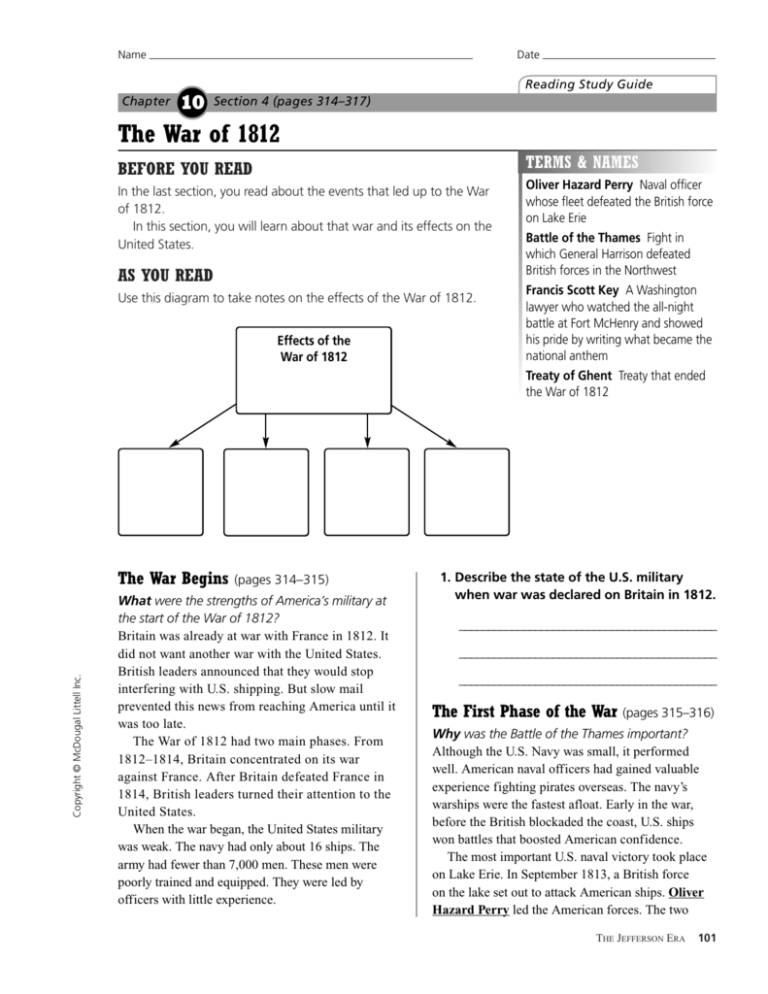
Name Date Reading Study Guide Chapter 10 Section 4 (pages 314–317) The War of 1812 BEFORE YOU READ TERMS & NAMES In the last section, you read about the events that led up to the War of 1812. In this section, you will learn about that war and its effects on the United States. Oliver Hazard Perry Naval officer whose fleet defeated the British force on Lake Erie AS YOU READ Use this diagram to take notes on the effects of the War of 1812. Effects of the War of 1812 Battle of the Thames Fight in which General Harrison defeated British forces in the Northwest Francis Scott Key A Washington lawyer who watched the all-night battle at Fort McHenry and showed his pride by writing what became the national anthem Treaty of Ghent Treaty that ended the War of 1812 Copyright © McDougal Littell Inc. The War Begins (pages 314–315) What were the strengths of America’s military at the start of the War of 1812? Britain was already at war with France in 1812. It did not want another war with the United States. British leaders announced that they would stop interfering with U.S. shipping. But slow mail prevented this news from reaching America until it was too late. The War of 1812 had two main phases. From 1812–1814, Britain concentrated on its war against France. After Britain defeated France in 1814, British leaders turned their attention to the United States. When the war began, the United States military was weak. The navy had only about 16 ships. The army had fewer than 7,000 men. These men were poorly trained and equipped. They were led by officers with little experience. 1. Describe the state of the U.S. military when war was declared on Britain in 1812. ____________________________________________ ____________________________________________ ____________________________________________ The First Phase of the War (pages 315–316) Why was the Battle of the Thames important? Although the U.S. Navy was small, it performed well. American naval officers had gained valuable experience fighting pirates overseas. The navy’s warships were the fastest afloat. Early in the war, before the British blockaded the coast, U.S. ships won battles that boosted American confidence. The most important U.S. naval victory took place on Lake Erie. In September 1813, a British force on the lake set out to attack American ships. Oliver Hazard Perry led the American forces. The two THE JEFFERSON ERA 101 The War of 1812 continued 2. What was the importance of the Battle of the Thames? ____________________________________________ ____________________________________________ ____________________________________________ The Second Phase of the War (pages 316–317) What happened at Fort McHenry? The war in Europe ended in April of 1814. After that, Britain concentrated on defeating the United States. They attacked on several fronts. The British attacked Washington, D.C. There, they burned public buildings, including the White House. Then they attacked Fort McHenry at Baltimore. A Washington lawyer named Francis Scott Key watched the all-night battle. At dawn, Key saw the fort’s flag still flying. He showed his pride by writing what became the U.S. national anthem, the “Star Spangled Banner.” In the North, the British sent a force from Canada across Lake Champlain. Its goal was to push south and cut off New England. The plan had failed by September 1814. At that time, an American fleet defeated the British in the Battle of Lake Champlain. 102 CHAPTER 10 SECTION 4 In the South, the British made the strategic port of New Orleans their target. A U.S. general, Andrew Jackson, put together an army to defend the port city. When the British launched their attack, they were quickly defeated by Jackson’s soldiers. The Battle of New Orleans made Jackson a hero. Even so, it was unnecessary. Officials had signed the Treaty of Ghent—which ended the War of 1812—two weeks earlier. Slow mails from England had delayed the news. 3. Who led the U.S. forces at the Battle of New Orleans? ____________________________________________ ____________________________________________ ____________________________________________ The Legacy of the War (page 317) How did the War of 1812 end? The Treaty of Ghent showed that the war had no clear winner. Neither side won territory, and border and trade disputes were not solved. But the war had four important consequences. 1) The heroism of Americans increased patriotism. 2) The war weakened Native Americans, who had sided with the British. 3) Because the war had interrupted trade, Americans were forced to make many of their own goods. This encouraged the growth of U.S. manufacturers. 4) Finally, the United States proved it could defend itself against the mightiest military power of the time. 4. Who won the War of 1812? ____________________________________________ ____________________________________________ ____________________________________________ Copyright © McDougal Littell Inc. sides exchanged cannon shots for two hours. After Perry’s ship was demolished, he rowed to another ship and took charge. He then went on to win the battle. After the victory, Perry sent a note to General William Henry Harrison, who then set out to attack the British on land. By the time Harrison reached Detroit, the British had fled to Canada. Harrison pursued the British forces and defeated them at the Battle of the Thames. This victory ended the British threat in the Northwest. The battle also claimed the life of Tecumseh, who died fighting for the British.
